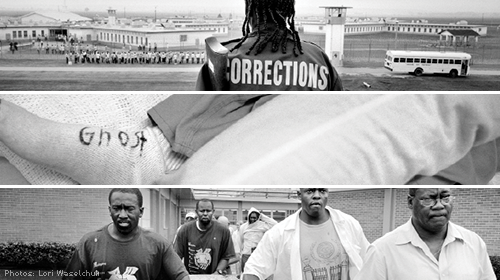
Ever wonder what could land you in prison for the rest of your life? For 3,278 people, it was nonviolent offenses like shoplifting a few cameras from Wal-Mart, stealing a $159 jacket, or serving as a middleman in the sale of $10 of marijuana.
That's right. People as young as 18 will spend the rest of their lives behind bars for crimes like taking a wallet from a hotel room, shoplifting three belts, or possessing a bottle cap smeared with heroin residue.
Mothers and fathers will be separated from their kids forever. People convicted of their first offense will be permanently denied a second chance. Many young Black and low-income men and women will be locked up until they die. And taxpayers will spend billions to keep them behind bars.
As the new └Ž░─├┼┐¬Į▒Įß╣¹ report A Living Death: Life Without Parole for Nonviolent Offenses reveals, the failed, outdated approach of applying extreme sentences to drug and property crimes has reached absurd, tragic and costly heights.
Does Patrick Matthews' story seem like a fair or smart approach to criminal justice to you? Three years ago, Patrick was arrested while riding in the truck of a friend who pawned some stolen tools and a welding machine, which he was convicted of helping to steal from a shed and a yard. Patrick is now 25. "I never in the world would've thought that could happen," he says. "Made one mistake and was treated like a murderer." Patrick was convicted and sentenced to serve a sentence of life without parole because he had burglarized a fruit stand and pawn shop with friends one day when he was 17, even though he had no violent criminal history and had never served a day in prison. One of the judges who reviewed Patrick's appeal said he did not "believe that the ends of justice are met by a mandatory sentence for this 22-year-old defendant," but that legislation mandated sending Patrick away for the rest of his life. He desperately misses his two young children, Blayton and Hayley, who are eight and six years old.
What a waste of human life and public resources that could be much better spent.

Click here to see the full ad from the └Ž░─├┼┐¬Į▒Įß╣¹.
Among the other people serving life without parole for nonviolent offenses are veterans and other addicts struggling with drug dependency. Others spiraled into drug addiction when they could not find work, and some began selling drugs to pay the bills after they lost their jobs or to pay off medical debts incurred when they were uninsured. Some are mentally ill. An estimated 65% percent of them are Black. Seventy-nine percent of them were convicted of nonviolent crimes connected to the failed War on Drugs. In the vast majority of the cases surveyed by the └Ž░─├┼┐¬Į▒Įß╣¹ (83.4%), the sentence of life without parole was mandatory ŌĆō the judge had no choice but to follow sentencing laws that require sending someone to prison until they die. And now, behind bars, many of them told the └Ž░─├┼┐¬Į▒Įß╣¹ that they struggle with depression and suicidal thoughts, knowing that there is no hope of ever going home.
These people's problems ŌĆō poverty, mental illness, drug dependency ŌĆō were not solved by sending them to prison until they die. And most of the nonviolent crimes for which these prisoners are serving life without parole would be more appropriately addressed outside the criminal justice system altogether, by providing drug treatment and mental health resources.
Crime rates have dropped nationwide over the last twenty years, but we're sentencing 400% more people to life without parole than we were twenty years ago. This defies commons sense. The explosion in life without parole sentences is part of a larger, failed approach to criminal justice ŌĆō an approach characterized by unnecessarily and unproductively extreme penalties. The result? An aging prison population that costs more and more to lock up as their health deteriorates, strapped state budgets, and too many people locked up for too long.
It's time to abandon the mindset that our criminal justice system should only be about extreme, one-size-fits-all punishment ŌĆō particularly when the skyrocketing number of these sentences being meted out is grossly out of proportion with crime rates, which are falling. We need to create laws that are smarter, fairer, and more humane.
TAKE ACTION: Tell President Obama to set up a commission to review and reduce the extreme sentences of the over 2,000 people locked in federal prisons until they die for nonviolent offenses.
Read the complete report, including over 100 profiles of people serving life without parole for nonviolent offenses, at www.aclu.org/livingdeath.
Learn more about prison conditions and other civil liberty issues: Sign up for breaking news alerts, , and .
